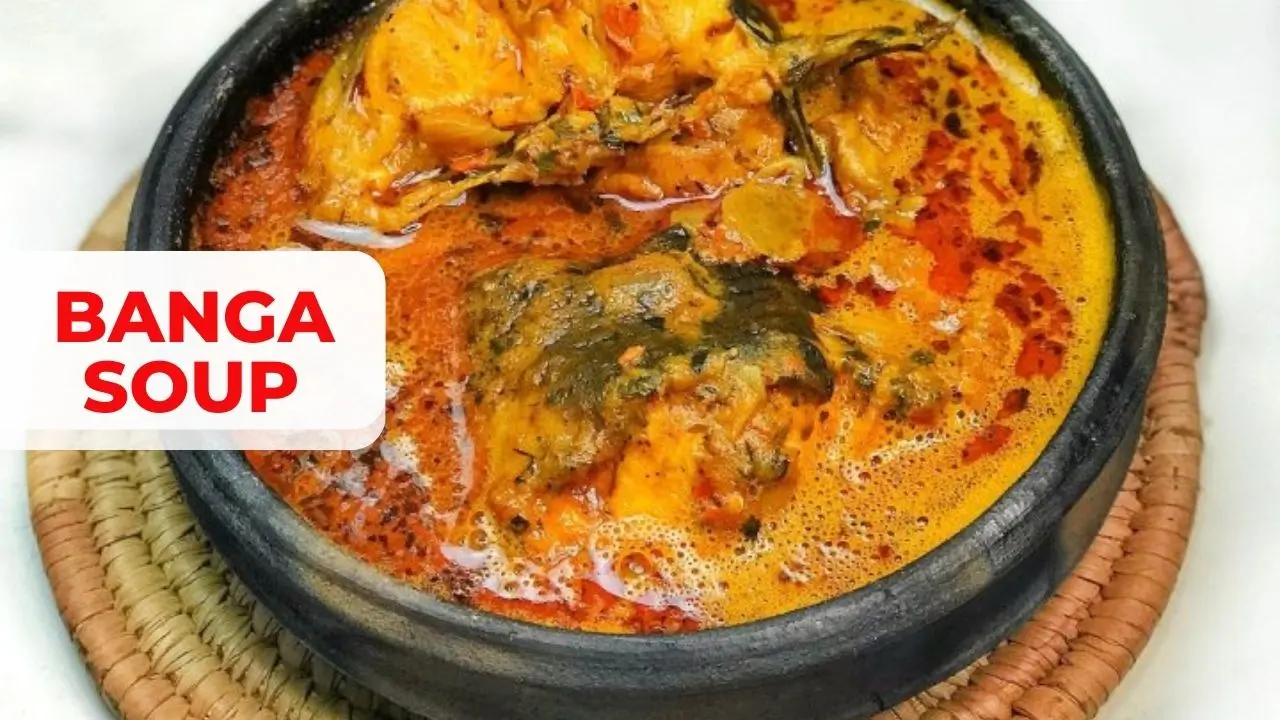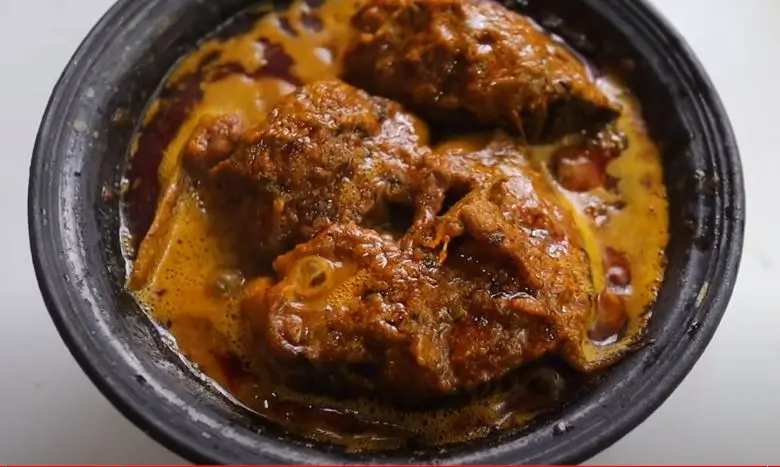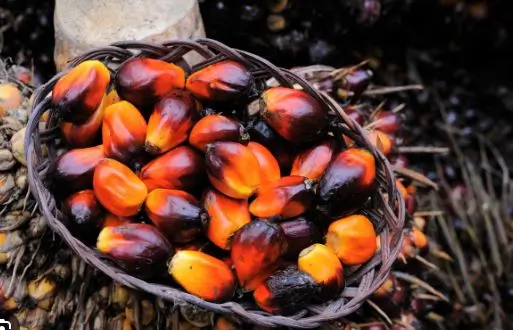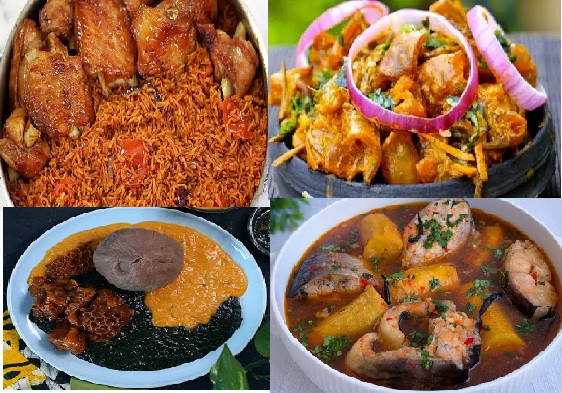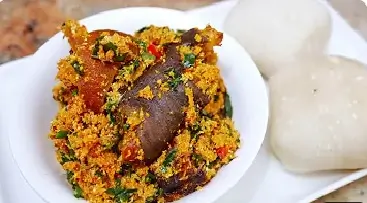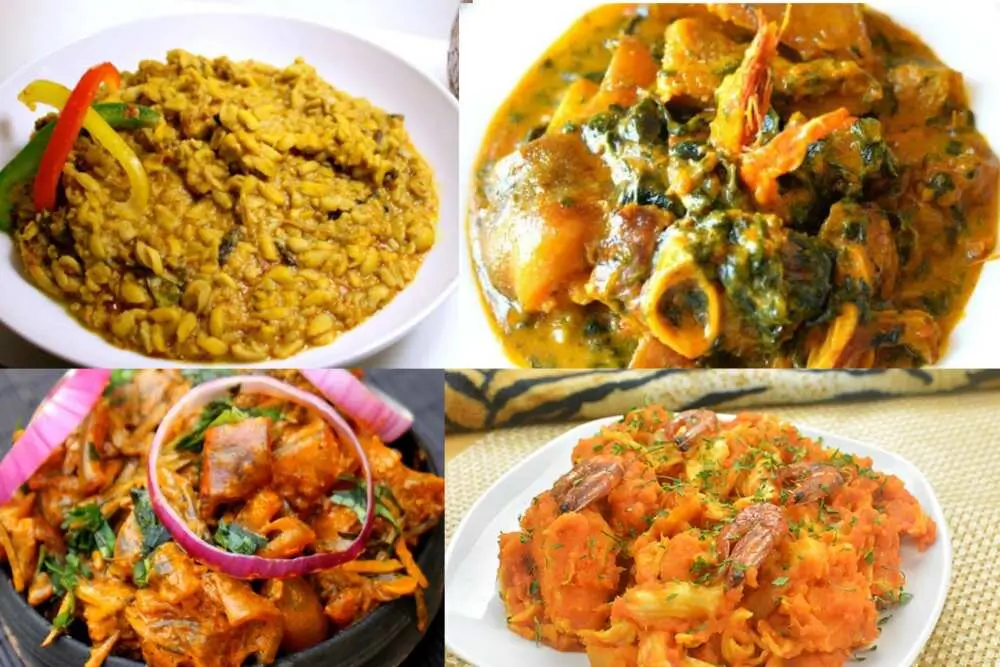Famous throughout West Africa, Banga soup is particularly famous in Nigeria. It is a delectable and healthy soup. It is made from palm nut fruit, which is the source of red palm oil, one of the most widely used cooking oils in Africa.
Banga soup has a rich flavour that goes well with various types of food, such as eba, pounded yam, fufu, or rice.
In this article, we will explore everything you need to know about Banga Soup, including its origin, ingredients, nutritional and health benefits, and risks. If you’re ready to enjoy Banga Soup, Let’s begin!
What is Banga Soup?
Banga soup, which is also known as palm nut soup or Ofe Akwu in Igbo, is a delicious soup made from the juice or cream extracted from palm nut fruits. These fruits come from the oil palm tree (Elaeis guineensis), which is native to tropical regions in Africa and Asia.
The Palm Nut fruits have a hard, reddish-orange shell that houses the kernel, which is rich in oil. This oil is extracted by boiling, pounding, and straining the fruits, after which it can be used for cooking or making soap. The pulp that remains after the oil is extracted can be processed into a thick paste or broth that is used for making banga soup.
Banga soup is typically cooked with meat or fish, such as beef, goat, chicken, catfish, or snail. To add flavour, it is seasoned with a mixture of spices and herbs, including Cameroon pepper, crayfish, Banga spice (a blend of ataiko and irugeje), oburunbebe stick (also known as African licorice stick), and beletientien leaves (also known as scent leaves or basil).
Depending on the region or person cooking, it can be made with other ingredients, such as okra, periwinkle, dried prawns, stockfish, or ugu leaves. Banga soup is enjoyed with Starch in the Niger Delta Region of Nigeria, and it can also be served with any other type of Swallow like Eba (Garri) or Fufu. Some people also choose to eat banga soup with Yam or rice, depending on how it is prepared.
The Origin and History of Banga Soup
Banga soup originates from the Niger Delta region of Nigeria, which is home to many ethnic groups, such as the Urhobo, Itsekiri, Ijaw, Isoko, and Ukwuani. These groups have been cultivating oil palm trees for centuries and using their fruits for various purposes.
According to some sources, Banga Soup was first prepared by the Urhobo people, who live along the banks of the Niger River. They would harvest the palm nuts from their farms and boil them in large pots until they were soft enough to be pounded. They would then pound the nuts in wooden mortars to separate the pulp from the kernels. The pulp would then be squeezed to extract the juice or cream that would be used to make Banga soup.
Banga soup was originally a delicacy that was reserved for special occasions, such as festivals, weddings, or ceremonies. It was also a symbol of wealth and status, as only the rich and influential could afford to buy or prepare large quantities of palm nuts. Banga soup was usually served in clay pots called evwere, which were specially treated to preserve the flavour and aroma of the soup. The soup was also accompanied by delta starch, which is a type of starch made from cassava starch that is native to the Niger Delta region.
Over time, Banga soup became more popular and spread to other parts of Nigeria, especially among the Igbo people of the southeastern region. The Igbo people adapted the recipe and called it ofe akwu, which means palm nut stew. They also added more ingredients, such as Ogiri (a type of fermented locust bean), and ate it with rice instead of swallowing. Ofe akwu is usually served as a sauce for boiled rice or yam rather than as a soup.
Banga soup has also spread to other West African countries, such as Cameroon, Ghana, Ivory Coast, and Liberia, where it is known by different names and prepared with slight variations. For example, in Cameroon, it is called mbanga soup and is made with smoked fish and njangsa seeds (a type of nutmeg).
In Ghana, it is called abe nkwan or Palm Nut Soup, and is made with chicken or goat meat and kontomire leaves (a type of spinach). In Ivory Coast, it is called sauce graine or sauce noix de palme and is made with snails or crabs and okra. In Liberia, it is called palava sauce or palm butter soup and is made with bitter leaves and egusi seeds (a type of melon).
Banga Soup Ingredients
Banga Soup can be made with different ingredients depending on availability, the cook’s choice, or the region. However, some main ingredients are essential for making the soup. These are:
- Banga (Palm fruits): These oil palm nuts have been boiled and soaked to soften. They provide a nutty flavour and thick texture.
- Palm Oil: This adds rich orange colour and smoothness. You can use palm oil or palm fruit extract.
- Assorted Meat and Fish: These can include beef, goat, smoked fish, stockfish, dry fish, shrimp, or any other of your choice.
- Onions: for Spicing and flavour.
- Pepper: any pepper at your disposal.
- Vegetable leaves: pumpkin leaves, ugu leaves, or spinach.
- Seasonings: salt, seasoning cubes (Maggi), and others of choice.
How to make Banga Soup
Banga soup is a delicious and nutritious dish that can be prepared at home with some simple steps. Follow the steps below:
Step 1: Prepare the Palm Nut (Banga)
- Wash and rinse the Palm Fruits.
- Boil the palm nuts in a large pot of water for about 30 minutes until they are soft and the skin can be easily peeled off.
- Drain the palm nuts and remove the skin and the kernel. You can use a mortar, pestle, or food processor.
- Transfer the peeled palm nuts to a pot and add some water. Cook until smooth, and sieve it.
Step 2: Cook the Meat or Fish
- Season the assorted meat (beef, goat, chicken, or Fish) with salt, pepper, onion, and seasoning cubes (Maggi) to taste.
- Boil the meat in a separate pot until tender and set aside. Reserve some of the meat stock for later use.
- Fry the Fish and meat if you wish.
Step 3: Add the Palm Nut Cream and Spices to the Pot
- Heat some oil in a large pot over medium-high heat and fry some chopped onions until soft.
- Add salt, pepper, seasoning cubes, crayfish, iru (fermented locust beans), ogiri (fermented sesame seeds), or any other seasoning you can taste.
- Add some Banga spice (also known as obenetietien), a special blend of spices that gives Banga soup its unique flavour and aroma.
- Add some fresh vegetable leaves, like scent leaves (nchanwu), ugu, or any other vegetable you choose, to the pot.
Step 4: Cook the Soup until Thick
- Reduce the heat and simmer the soup for about 15 to 20 minutes, stirring occasionally to prevent burning.
- Add some reserved meat stock if the soup is too thick or dry.
- Add the cooked meat and seafood to the pot and mix well.
Step 5: Add Seasonings
- Add some chopped fresh or dried uziza leaves (also known as Ashanti pepper leaves) to the pot if you like. Uziza leaves add some spiciness and flavour to the soup.
- Taste the soup and add seasoning if it’s not enough, with more salt, pepper, seasoning cubes, or Banga spice if needed.
- Allow the whole stock to cook for a few minutes.
- Turn off the heat and let the soup cool for a few minutes before serving.
How to Enjoy Banga Soup
You can enjoy the Soup with Fufu, Eba, Pounded Yam, Amala, Tuwo Shinkafa, and Semolina. Some people eat Soup with rice, yam, or any other food you choose.
You can also enjoy Banga Soup with Starch:
Banga Soup and Starch
Banga soup and starch is a famous and delicious dish native to the Delta State of Nigeria. Starch is made from cassava starch and water. It is cooked over low heat until it forms a solid and can be moulded into balls or shapes. Starch is often yellow and added with palm oil to make it more appealing.
The Health Benefits and Risks of Banga Soup
Banga soup is not only tasty but also healthy. It has several benefits and risks you should be aware of before consuming them. Banga soup has many health benefits, such as:
- Rich in vitamins and minerals: Banga soup is rich in vitamins and minerals essential for your body’s functions. For example, palm nuts are a good source of vitamin E, an antioxidant that protects your cells from damage and ageing.
- Supports good brain function: Banga soup can also keep your brain function and mental health. For instance, palm nuts contain omega-3 fatty acids, which are essential for your brain’s development and function.
- Prevents vitamin A deficiency: Banga soup can also prevent vitamin deficiency, a common problem in many developing countries. Vitamin A deficiency can cause night blindness or dry eyes.
The Risks of Banga Soup
Banga soup also has some risks you should be aware of before consuming it. Some of these risks are:
- It is high in calories and fat: Banga soup is high in calories and fat, which can contribute to weight gain and obesity if you eat it too much.
- It may trigger allergies or intolerances: Banga soup may also trigger allergies or intolerances in some people sensitive to specific ingredients. For example, some people may be allergic to palm nuts or palm oil, which can cause symptoms such as itching, hives, or swelling.
Can a Pregnant Woman Eat Banga Soup?
Yes, a pregnant woman can eat Banga Soup. The soup is rich in vitamin A, healthy fats, protein, and iron, which provide benefits like good vision, lowered cholesterol, increased haemoglobin, and tissue growth.
However, Banga soup is also high in calories and sodium, leading to excessive weight gain, gestational diabetes, high blood pressure, and associated risks. In addition, Banga soup may contain harmful bacteria or parasites if not properly washed and cooked, causing food poisoning, infections, diarrhoea, fever, or pregnancy complications.
Therefore, pregnant women should eat Banga soup in moderation, limiting their portions. They should also ensure it is hygienically prepared and cooked well to get the nutritional benefits of the soup while avoiding potential downsides like foodborne illness or excessive weight gain that could adversely impact both mother and child.
Can Ulcer Patient Eat Banga Soup?
Banga soup contains palm oil, meat/fish, and onions, which may aid ulcer healing. However, it also contains irritating ingredients like pepper, crayfish, and MSG (Monosodium Glutamate), which can worsen ulcers.
Mild ulcer cases can handle well-cooked palm nut soup eaten in moderation. However, if your Ulcer is severe, avoid eating the Soup or consult your doctor before consuming it.
If you have an Ulcer, consult your doctor before eating banga soup or other spicy/oily foods. The Soup may be suitable for mild cases if prepared properly and cautiously.
Can a Diabetic Patient Eat Banga Soup?
Diabetic patients can eat Banga soup if they choose a suitable starch or swallow food, limit portion size, and watch the kinds of ingredients used. Banga soup can provide healthy fats, protein, and other nutrients that can help manage diabetes.
However, diabetic patients should also regularly monitor their blood sugar levels and consult their doctor before eating banga soup or spicy or oily food.
Difference Between Banga Soup and Banga Stew
Banga soup and Banga stew are Nigerian dishes made from palm fruit extract, spices, and various meats or fish. The slight difference is that the Stew is used for eating rice or other food, while the Soup is used for swallow foods.
Banga Soup Is From Which State?
Banga soup is a traditional dish from the Niger Delta region of Nigeria, particularly the Urhobo and Itsekiri ethnic groups. The name “Banga” comes from the local word for palm nut, the soup’s main ingredient.
Palm Nut Soup is made by extracting the oil and cream from boiled palm nuts and adding various spices, meats, fish, and vegetables to create a rich and delicious soup.
Banga (Palm Nut) Producing States in Nigeria
Nigeria is one of the world’s largest producers and consumers of palm oil and palm nuts. Palm oil is derived from the flesh of the palm fruit, while palm nuts are the seeds inside the fruit. Palm nuts are used to make Banga soup and other products such as palm kernel oil and palm kernel cake.
Palm trees are widely cultivated in Nigeria, especially in the southern and eastern states. Some of the major palm-producing states in Nigeria are:
- Akwa Ibom
- Cross River
- Rivers
- Bayelsa
- Delta
- Edo
- Abia
- Imo
- Anambra
- Enugu
- Ondo
- Ogun
- Benue and others.
Conclusion
Banga soup is a delicious and a famous Nigerian dish that can be served with different types of foods. It offers several health benefits, such as providing vitamins, minerals, omega-3 fatty acids, and antioxidants that can support the health of your brain, eyes, and immune system.
However, it also has some health risks due to its high calorie and fat content and potential contamination from oil spills. Therefore, it is essential to consume Banga soup in moderation and to be mindful of the source and quality of the ingredients.
Banga soup is a perfect example of Nigeria’s and Africa’s rich and diverse culinary heritage.

